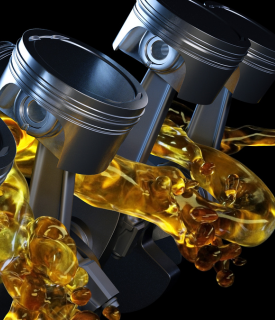
Hydraulic Oils
Hydraulic oil is an essential lubricant for machinery and equipment that facilitates minimize wear and tear, eliminates friction, and prevents overheating. Petrotek offers a broad range of hydraulic oils designed to satisfy different industrial requirements.
Product Features:
Lowers the deterioration of machine parts.
Reduces energy usage, boosts efficiency, and reduces friction.
Function as a coolant to keep machinery from overheating.
Reduces the noise produced by running machines.
Options such as zinc-free and biodegradable oils available.
Types of Hydraulic Oils:
Zinc-Free Hydraulic Oils: Designed without zinc, which makes them perfect for uses where the presence of zinc could be challenging, including machinery requirements or environmental concerns.
Zinc-Containing Hydraulic Oils: It consists of additives based on zinc, which offer high resistance to wear and can be used in an array of industrial applications.
Synthetic Hydraulic Oils: Derived from synthetic basic stocks such as polyalkylene glycol (PAG) or polyalphaolefin (PAO). They provide lower pour points, better oxidation stability, and resistance to extreme temperatures degradation.
Hydraulic Oils with Detergency Properties: It contains detergents that spread impurities throughout the system to maintain it clean and avoid the buildup of sludge and varnish.
High Viscosity Index Hydraulic Oils: Maintains its viscosity consistent across a broad temperature range, guaranteeing stable performance in both hot and cold settings.
Fire Resistant Hydraulic Oils: Made to withstand ignition and offer improved safety in high-risk situations, like those involving open flames or high temperatures.
Food Grade Hydraulic Oils: Safe for accidental contact with food items, making it appropriate for use in equipment used in food processing and packaging.
Water Based Hydraulic Oils: Primarily composed of water, it has exceptional fire resistance and is utilized in situations when fire safety is crucial.
High Temperature Hydraulic Oils: Developed to function in extremely hot temperatures, guaranteeing dependable machinery functioning in extreme heat scenarios.
Applications:
Several uses for hydraulic oils function to improve the efficiency of machines, such as:
Ensures that automobiles' hydraulic systems operate well.
Hydraulic oils are specifically designed for high-stress situations.
Heavy-duty oils resistant to fire and high temperatures.
Hydraulic oils based on water for use in maritime environments.
Food-grade oils are used in machinery that comes into contact with food.
Guarantees the equipment's lifespan and smooth operation.
Industries:
Manufacturing
Automotive
Aerospace
Food and Beverage
Construction
Marine
Specifications:
Hydraulic Oil Types: HL (HL), HLP (HM), HLPD (HG), HVLP.
Viscosity Grades: ISO VG 5 to ISO VG 100
Packaging Sizes: 20 liters, 205 liters, 1000 liters

Hydraulic Oils
Hydraulic oil is an essential lubricant for machinery and equipment that facilitates minimize wear and tear, eliminates friction, and prevents overheating. Petrotek offers a broad range of hydraulic oils designed to satisfy different industrial requirements.
Product Features:
Lowers the deterioration of machine parts.
Reduces energy usage, boosts efficiency, and reduces friction.
Function as a coolant to keep machinery from overheating.
Reduces the noise produced by running machines.
Options such as zinc-free and biodegradable oils available.
Types of Hydraulic Oils:
Zinc-Free Hydraulic Oils: Designed without zinc, which makes them perfect for uses where the presence of zinc could be challenging, including machinery requirements or environmental concerns.
Zinc-Containing Hydraulic Oils: It consists of additives based on zinc, which offer high resistance to wear and can be used in an array of industrial applications.
Synthetic Hydraulic Oils: Derived from synthetic basic stocks such as polyalkylene glycol (PAG) or polyalphaolefin (PAO). They provide lower pour points, better oxidation stability, and resistance to extreme temperatures degradation.
Hydraulic Oils with Detergency Properties: It contains detergents that spread impurities throughout the system to maintain it clean and avoid the buildup of sludge and varnish.
High Viscosity Index Hydraulic Oils: Maintains its viscosity consistent across a broad temperature range, guaranteeing stable performance in both hot and cold settings.
Fire Resistant Hydraulic Oils: Made to withstand ignition and offer improved safety in high-risk situations, like those involving open flames or high temperatures.
Food Grade Hydraulic Oils: Safe for accidental contact with food items, making it appropriate for use in equipment used in food processing and packaging.
Water Based Hydraulic Oils: Primarily composed of water, it has exceptional fire resistance and is utilized in situations when fire safety is crucial.
High Temperature Hydraulic Oils: Developed to function in extremely hot temperatures, guaranteeing dependable machinery functioning in extreme heat scenarios.
Applications:
Several uses for hydraulic oils function to improve the efficiency of machines, such as:
Ensures that automobiles' hydraulic systems operate well.
Hydraulic oils are specifically designed for high-stress situations.
Heavy-duty oils resistant to fire and high temperatures.
Hydraulic oils based on water for use in maritime environments.
Food-grade oils are used in machinery that comes into contact with food.
Guarantees the equipment's lifespan and smooth operation.
Industries:
Manufacturing
Automotive
Aerospace
Food and Beverage
Construction
Marine
Specifications:
Hydraulic Oil Types: HL (HL), HLP (HM), HLPD (HG), HVLP.
Viscosity Grades: ISO VG 5 to ISO VG 100
Packaging Sizes: 20 liters, 205 liters, 1000 liters
Enquire Form









